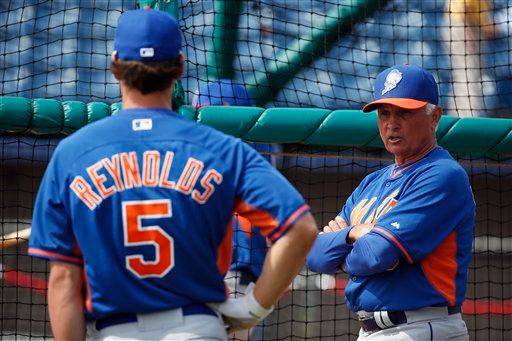 |
| Image from MetsMerized |
The Mets shortstop prospect has not been as productive with Las Vegas
this year, but other than a drop in BABIP, he’s been basically the same hitter.
Thanks
to a breakout 2014 season, Matt Reynolds catapulted his status from fringe org.
guy to top-15 prospect within a loaded Mets system, but there were still
questions about his future role in the majors. His defense at SS was still in
question at the end of last year, and his big offensive campaign was boosted by
an unsustainable .404 BABIP with Las Vegas. After the season ended, I took a closer
look at the Reynolds outbreak, and concluded that he was most likely a
future utility infielder. I thought that he still had room to improve his game
as he entered his age-24 season, especially if he could get back to the above
average K and BB rates he displayed through Binghamton, but it was unlikely that
he would repeat a .400 BABIP this year. Unfortunately, although his defense has
looked better at SS this season, Table 1 below shows how he’s been the same
batter at the plate, just with less BABIP luck.
Table 1 – Comparing Matt Reynolds stats with Las Vegas over
the past 2 seasons
PA
|
BABIP
|
XBH/AB
|
ISO
|
K%
|
BB%
|
wRC+
|
|
2014
|
301
|
.404
|
9.4%
|
.146
|
19.9
|
7.0
|
124
|
2015
|
353
|
.328
|
10.1%
|
.139
|
19.3
|
7.1
|
98
|
Reynolds
has displayed some similar peripherals this year, but his BABIP has dropped by
76 points, which has been the biggest factor in his wRC+ drop of 26 points. His
HR-rate is also down slightly, but he’s hitting doubles at a much higher rate
this year, which has allowed him to maintain an average PCL ISO. To investigate
the drop in BABIP, we can use the spray charts and batted ball data available
at MLBFarm.com, which I’ve displayed in Figure 1 and Table 2 below.
As
you can see from Figure 1, Reynolds is hitting the ball in the air more often
this year, and his line drive rate has seen the biggest bump. He’s also going
to RF more often this year, which is what he focused on with Binghamton during
the first half of 2014. The bump in line drive rate would appear to disagree
with his drop in BABIP, but as you can see in Table 2, his average on line
drives has not been the issue this year.
Table 2 – Batting average by batted ball type over the past
2 seasons
AVG on GB
|
AVG on FB
|
AVG on LD
|
|
2014
|
.310
|
.377
|
.681
|
2015
|
.290
|
.188
|
.627
|
Table
2 shows that Reynolds was actually very lucky on fly balls last year, which led
to his high BABIP, but he’s been below average this year, which has led to the
an average BABIP. Compared to major league averages on those batted ball types,
Reynolds is still getting hits on groundballs at an above average rate, but is a
little below average by line drive rate and fly ball rates. I don’t have the
same numbers for the PCL, but considering fly ball hitters benefit the most in
that high offense environment, I’d guess that the league average on fly balls
is higher in the PCL than in the majors.
Overall,
Reynolds has been a PCL average hitter while playing solid SS defense this year
for Las Vegas, which is nice to have from a 24-year old in the system. Although
his rate production is down this season, he’s been basically the same hitter as
he was in 2014, which is actually more disappointing to me than the drop in
wRC+. He hasn’t improved his K% or BB% in 2015, and those were the two most
notable areas that Reynolds could improve upon coming into this season.
Moving forward, I would like to see him show improved K and BB rates down the stretch, and I think he could be helpful on the big club in September. The Mets will need to add him to their 40-man roster to protect him this winter anyway, and he could be a useful extra middle infielder or pinch-runner – he doesn’t have blazing speed, but he’s faster than most on the current 25-man roster. Assuming he sticks with the Mets, I could see him taking over for Ruben Tejada as soon as next year, especially since he’ll be the cheaper option.
Moving forward, I would like to see him show improved K and BB rates down the stretch, and I think he could be helpful on the big club in September. The Mets will need to add him to their 40-man roster to protect him this winter anyway, and he could be a useful extra middle infielder or pinch-runner – he doesn’t have blazing speed, but he’s faster than most on the current 25-man roster. Assuming he sticks with the Mets, I could see him taking over for Ruben Tejada as soon as next year, especially since he’ll be the cheaper option.
#OTD in 1981 Dynamics Explorer launched; 2 satellites studied Earth’s upper & lower atmosphere
http://t.co/vWyhwr2hCp pic.twitter.com/mj4BbQ9qP7
— NASA History Office (@NASAhistory) August 3, 2015


Leave your comment
Post a Comment